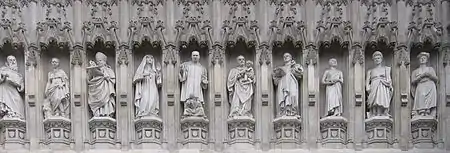Esther John
Esther John (Urdu: استر جون), born Qamar Zia (Urdu: قمر ضياء), on 14 December 1929; died 2 February 1960) was a Pakistani Christian nurse who was murdered in 1960 for her efforts in Christian evangelism. She was subsequently recognized as a Christian martyr. In 1998, she was honoured with a statue above the great west door of Westminster Abbey, among nine other Christian martyrs of the twentieth century.[1]

Early life
Qamar Zia was born into an Islamic family on 14 December 1929, in British India. She attended a Christian school from the age of seventeen, and was so inspired by the Book of Isaiah that she decided to convert to Presbyterian Christianity.[1]
Career
After the partition of colonial India, Zia's family migrated from Madras in independent India to the newly-born Pakistan in 1947.[2] She continued to study the Bible in secret, and seven years later ran away from home, fearing that her family would force her into a marriage. She took a job in an orphanage in Laugesen, Karachi, and changed her name to Esther John. In June 1955, she moved to Sahiwal, where she lived and worked in a mission hospital. From 1956 to 1959, she trained to be a teacher at the United Bible Training Centre in Gujranwala, then spent the remainder of her life evangelizing in the villages around Chichawatni.
Death
Due to her efforts in Christian evangelism, Esther John was murdered in her bed on 2 February 1960, at her home in Chichawatni. She was buried at the Christian cemetery at Sahiwal. As such, she is recognized as a Christian martyr.[3]
In 1998, ten statues were unveiled above the great west door of Westminster Abbey in London, depicting ten 20th century Christian martyrs. Esther John was among them, alongside such figures as Óscar Romero and Martin Luther King Jr.[4]
References
- Foxe: Voices of the Martyrs, AD33 – Today. Salem Books. 8 October 2019. p. 275. ISBN 978-1-68451-008-5.
Esther John was born in British-ruled India with the Indian name of Qamar Zia. She was educated in a Christian school where Bible reading and her teachers' vibrant faith led to her conversion as a teenager. When Qamar gave her heart to Jesus Christ, she began a life of service and growth in which each new day was a gift. When India was partitioned, Qamar moved with her family to Pakistan, where she was pledged to a Muslim husband. Unwilling to accept this family decision, Qamar fled to Karachi. There she found a missionary, Marian Laugesen, who provided a Bible, encouragement, and a job working in an orphanage. At this time Qamar took the name Esther John.
- Moore, Johnnie; Pattengale, Jerry (7 March 2023). The New Book of Christian Martyrs: The Heroes of Our Faith from the 1st Century to the 21st Century. Tyndale House Publishers. p. 379-381. ISBN 978-1-4964-2948-3.
India (and Britain) partitioned off Pakistan in 1947 for Indian Muslims—and they established their own constitution in 1956. Meanwhile, India remained mostly Hindu. Zia's parents had made the transition to the Muslim region, and Zia moved with them from Madras, India, to become refugees in Pakistan, the new Muslim country.
- Swain, Sharon (14 October 2020). "The life and death of Esther John". Larchwood Research. Retrieved 4 February 2023.
- "Esther John". Westminster Abbey. Retrieved 2013-02-18.